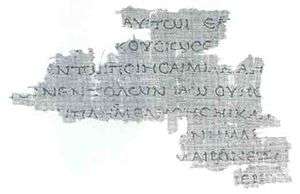4Q120


The manuscript 4Q120 (also pap4QLXXLevb) is a Septuagint manuscript (LXX) of the biblical Book of Leviticus. The Rahlfs-No. is 802. Palaoegraphycally is dating from the first century BCE. Currently the manuscript is housed in the Rockefeller Museum in Jerusalem.
This scroll is in a very fragmented condition. Today it consists of 97 fragments. However, only 31 of those fragments can be reasonably reconstructed and deciphered, allowing for a reading of Leviticus 1.11 through 5.25; the remaining fragments are too small to allow for reliable identification. In addition to smaller text-critical variants, the manuscript displays the divine name in Greek characters, as ΙΑΩ (the trigrammaton) in Leviticus 3:12 (frg. 6) and 4:27 (frg. 20), instead of later practise of replacing it with κύριος ("Lord"). Skehan suggest that the reading IAW is more original than Kurios.[1] IAO can be seen a transliteration of YAHO. The Codex Marchalianus is the only other extant manuscript of the Septaugint that uses ΙΑΩ to transcribe the tetragrammaton.[2] Scriptio continua is used throughout.
Additionally, space bands are occasionally used for the separation of concepts, and divisions within the text. An special sign (⌐) for separation of paragraphs is found fragment 27, between the lines 6 and 7. While the later divisions would label these verses 5:20-26, it appears to testify to a classical transition from chapter 5 to 6.
References
- ↑ Skehan, Patrick W. (1957). The Qumran Manuscripts and Textual Criticism,: Volume du congrès, Strasbourg 1956. Supplements to Vetus Testamentum 4. Leiden: Brill Publishers. pp. 148–160.
- ↑ David Edward Aune (2006). Apocalypticism, Prophecy and Magic in Early Christianity: Collected Essays. Mohr Siebeck. p. 363. ISBN 3-16-149020-7.
Bibliography
- Skehan, Patrick W. (1957). The Qumran Manuscripts and Textual Criticism,: Volume du congrès, Strasbourg 1956. Supplements to Vetus Testamentum 4. Leiden: Brill Publishers. pp. 148–160.
- Ulrich, Eugene (1992). 120. pap4QLXXLeviticusb in: Discoveries in the Judean Desert: IX. Qumran Cave 4 IV. Oxford: Clarendon Press. pp. 167–186,. ISBN 0-19-826328-7.
- Ulrich, Eugene (1992). by George J. Brooke and Barnabas Lindars. SBL Septuagint and Cognate Studies Series 33, eds. The Septuagint Manuscripts from Qumran: A Reappraisal of Their Value, in: Septuagint, Scrolls, and Cognate Writings. Atlanta: Scholars Press. pp. 49–80.